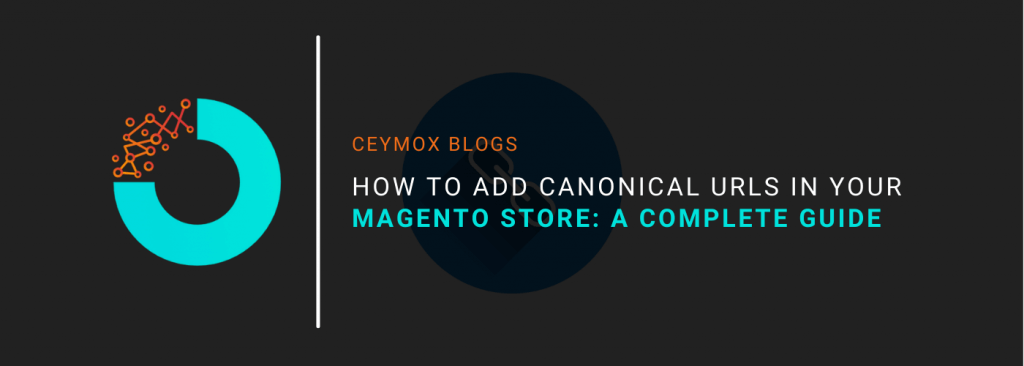
Uploading duplicate content on your site will not just arise plagiarism issues in your store but will also impact its search engine rankings as it is highly considered bad for SEO. There are many different reasons why most of the sites use several URLs which can lead to the same page or duplicate on different URLs.
For this particular purpose, a tag named “ canonical meta tag” is used. Using a canonical meta tag, you can tell the search engine about the master content of that page. For SEO purposes, this tag plays a very important role. This tag can help in improving the search engine rankings and boosting page views.
The reason why we are using just canonical URLs is because they can resolve duplicate content issues when multiple URLs are having similar or even identical content so the search engine can identify the prioritized URL.
In this article, we will know all the different aspects of the canonical URL and how you can add it to your Magento store. Also, we will know how Google chooses the canonical URL for ranking.
Canonical URL: Introduction
This URL is actually an address that is chosen as preferred for indexing or search engine ranking. It is also known as an HTML attribute which the development team applies in web pages so the search engines can decide where to assign the search value.
Suppose you have these pages for products or services which are the same:
If you don’t configure the settings on your Magento store, then the search engine will automatically consider one of these pages as canonical and will consider it most relevant. That’s why you can’t control the choice until you make any changes. So you have told the search engine which URL is the canonical URL and set 301 redirects for the rest of the pages.
Importance of Canonical Tag in Magento 2:
If there is a huge amount of duplicate content on your website and it gets detected by the search engine, then the search engine may restrict your site. It can also downrank your website and even give your domain a penalty. An e-commerce store is highly prone to such problems as there are highly varied URLs. If you properly use canonical tags, you can tell the crawlers which URL they have to consider original and have all the ranking power.
Make changes in the product pages with variations like size, colours, etc. Product belonging to multiple categories is the solution.
How Google chooses the Canonical URL?
Google uses many tools for choosing canonical URLs. It checks the main content and compares it for duplication between two similar pages. It will choose the most full and useful content for users. Apart from content, Google checks the security protocols of the page, sitemaps, and “rel=canonical” labels. The page that Google will choose as canonical will be crawled more which will improve its position on Google Search Engine Result Pages. Generally, Google search results contain canonical URLs and the only exceptional scenario is when the duplicate suits better. Also, if you can indicate the needed page as canonical, Google still may choose another one.
Note: If there are multiple languages on your Magento store, then Google will not consider a page with the same content as duplicated but the page should be completely translated including header, footer, body, and other text.
How to Add Canonical URLs in your Magento store?
It may seem to add canonical URLs is a cakewalk but it is not everyone’s cup of tea. Only experienced developers like us can efficiently add. Its complexity depends on which kind of page you are adding the canonical URL in your Magento store. Let’s know in details…
- You have to log in to your Magento Admin Panel and navigate to Stores > Settings > Configurations.
- Expand the catalogue menu and choose catalogue.
- Navigate to SEO settings.
If you want Google and other search engines to index the pages of your site with a complete category URL path, then make these changes:
- Choose Yes for “Make Use of Canonical link meta tag for categories”
- Choose Yes for “Make Use of Canonical link meta tag for products”
And if you only require Google to index the product pages only, then make these changes and complete the followed settings:
- Select Yes for “Make Use of Canonical link meta tag for products”
- Select No for “Make use of Canonical link meta tag for categories”
In case you want to index both, enable both these options:
- Choose Yes for “Make Use of Canonical link meta tag for categories”
- Choose Yes for “Make Use of Canonical link meta tag for products”
Make sure you saved the changes and clear the cache in end.
This is a very easy process and it will take just a few minutes. But for the CMS pages, the story is quite different.
For CMS pages:
In the latest security enhancement of Magento, now it has become harder to implement custom layout updates. You can’t freely add and remove code in the customer layout update anymore. It means that it will be quite tricky to add canonical URLs to your CMS pages, but obviously, it is not impossible, at least not for us. To add canonical to your CMS pages, start by identifying the specific page you need to add URLs.
Wrapping Up:
The Canonical URL is a highly powerful tool for SEO in your Magento store. It will help in managing the duplicate content on your site, tell the search engine which page it has to consider, and improve search engine rankings.
If you want to manage the canonical URLs on your Magento store and need help in other maintenance, then we are here for you. At Ceymox Technologies, the best Magento development company in India, we have expertise in developing Magento stores from scratch, enhancing features & functionalities, Magento version upgrade, maintenance, and whatnot. Let us know your requirements.
 Hubspot SEO Certified |  Hubspot SEO II Certified |  Google Ads Search Certified |  Google Analytics Certified |
Sreehari N Kartha is a skilled Digital Marketing Analyst at Ceymox, certified in SEO. His expertise encompasses a wide range of digital marketing strategies, including managing advertising campaigns on platforms like Google Ads, Facebook Ads, Instagram Ads, WhatsApp Ads, and LinkedIn Ads. With a strong foundation in SEO and SMM, Sreehari is adept at optimizing online visibility, driving engagement, and generating qualified leads and conversions. His passion for emerging technologies, such as Crypto, NFTs, and Web3, further complements his skillset, enabling him to navigate the dynamic digital landscape.
View All Articles